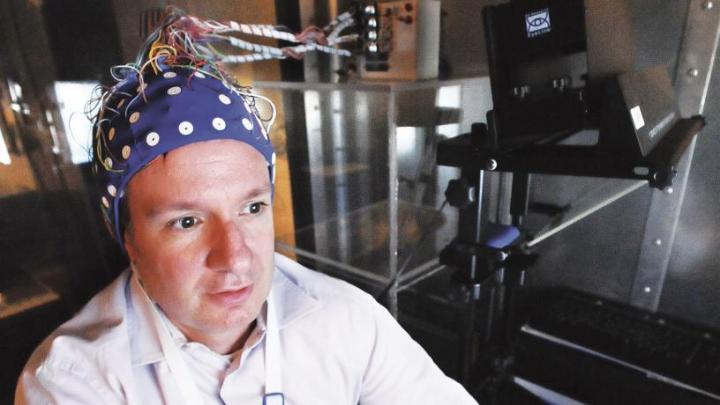
IMAGE: Paul Sajda, Columbia Engineering professor of biomedical engineering, electrical engineering, and radiology, has been awarded the Vannevar Bush Faculty Fellowship (VBFF) for 2019. The five-year, $3 million fellowship will… view more
Credit: Eileen Barroso for Columbia Engineering
New York, NY–May 2, 2019–Paul Sajda, professor of biomedical engineering, electrical engineering, and radiology, has been awarded the Vannevar Bush Faculty Fellowship (VBFF) for 2019. This honor is the U.S. Department of Defense’s most prestigious single-investigator award and supports basic research with the potential for transformative impact. The five-year, $3 million fellowship will support Sajda’s research in cognitive neuroscience.
“This fellowship will support any of my ‘blue sky’ research ideas,” Sajda says, “and will really help me pursue some research directions that are very risky.”
Sajda, who is also affiliated with Columbia University’s Data Science Institute, is one of 10 distinguished faculty to receive this highly competitive award that aims to advance transformative, fundamental, university-based research.
Sajda has long been interested in how our brains generate perception, cognition, and emotion in ecologically realistic settings and real-world tasks, and in how brain states differ in real-world vs more constrained, laboratory experiments.
“This VBFF award will give me the opportunity to address questions by providing resources for making measurements of neural activity, physiology, and human behavior ‘in-the-wild,’ and testing interventions that manipulate brain dynamics for real-world tasks.” he says.
The VBFF award will fund his proposal of a framework that engages macroscale brain circuitry central to rapid decision-making, specifically a circuit that includes the anterior cingulate (ACC), dorsal lateral prefrontal cortex (dlPFC), and locus coeruleus (LC). His overarching scientific hypothesis is that unique functional dynamics of the ACC-dlPFC-LC, particularly those reflecting modulation by stress, can be observed by linking neuro-physio-behavioral measurements from controlled laboratory settings with those conducted in naturalistic settings.
Sajda proposes a new approach that uses neuroimaging and neurostimulation technologies, already approved for human use, and state-of-the-art machine learning to fuse and integrate the resulting information revealed across different measurement modalities and task environments. He is hoping to develop a testable model of human brain dynamics that governs rapid decision-making in natural environments, and to use machine learning, particularly deep learning, to make linkages between EEG and fMRI neuroimaging measurements and tasks that are carried out in both highly controlled laboratory environments and those that are acquired in less well-controlled, but more ecologically realistic virtual and augmented reality.
His project will also focus on developing a new computational framework that enables fusion and “transcoding” of neural and physiological measurements between different modalities and noise conditions, allowing the development of a macro-scale neural circuit model that is based on high-resolution neuroimaging data as well as real-world tasks and behavior. An innovative aspect of the project will be his use of a closed-loop, endogenously triggered, neuromodulation to test causal interactions in this circuit and how these relate to behavior.
“The translation of models of brain dynamics from the laboratory to real-world setting opens the door for multi-human neural integration,” Sajda says. “These models create a natural ‘language’ by which neural systems can communicate. This communication could be both human-to-human and human-to-machine. For example, these models would facilitate human-agent teaming, by providing machine-based agents/actors with neurally-informed models of group and/or individual’s state-of-mind when making decisions.”
The 2019 Faculty Fellowship class will join a cadre of 55 current fellows, who conduct basic research in areas of importance to the DoD, ranging from materials science and cognitive neuroscience to quantum information sciences and applied mathematics. In addition to their research projects, fellows engage directly with the DoD enterprise to collaborate with DoD laboratories and share insights with DoD leadership and the broader national security community.
For the fiscal year 2019 competition, the DoD’s Basic Research Office received over 250 white papers, from which panels of experts selected the 10 fellows. Dmitri Basov, a professor of physics in the Department of Physics at Columbia University, also received an award to support his research in dynamic quantum matters.
###
Disclaimer: AAAS and EurekAlert! are not responsible for the accuracy of news releases posted to EurekAlert! by contributing institutions or for the use of any information through the EurekAlert system.

